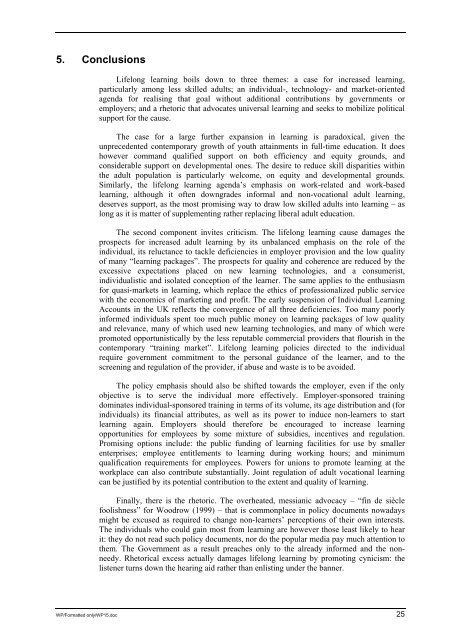Lifelong learning - International Labour Organization
Lifelong learning - International Labour Organization
Lifelong learning - International Labour Organization
Create successful ePaper yourself
Turn your PDF publications into a flip-book with our unique Google optimized e-Paper software.
5. Conclusions<br />
<strong>Lifelong</strong> <strong>learning</strong> boils down to three themes: a case for increased <strong>learning</strong>,<br />
particularly among less skilled adults; an individual-, technology- and market-oriented<br />
agenda for realising that goal without additional contributions by governments or<br />
employers; and a rhetoric that advocates universal <strong>learning</strong> and seeks to mobilize political<br />
support for the cause.<br />
The case for a large further expansion in <strong>learning</strong> is paradoxical, given the<br />
unprecedented contemporary growth of youth attainments in full-time education. It does<br />
however command qualified support on both efficiency and equity grounds, and<br />
considerable support on developmental ones. The desire to reduce skill disparities within<br />
the adult population is particularly welcome, on equity and developmental grounds.<br />
Similarly, the lifelong <strong>learning</strong> agenda’s emphasis on work-related and work-based<br />
<strong>learning</strong>, although it often downgrades informal and non-vocational adult <strong>learning</strong>,<br />
deserves support, as the most promising way to draw low skilled adults into <strong>learning</strong> – as<br />
long as it is matter of supplementing rather replacing liberal adult education.<br />
The second component invites criticism. The lifelong <strong>learning</strong> cause damages the<br />
prospects for increased adult <strong>learning</strong> by its unbalanced emphasis on the role of the<br />
individual, its reluctance to tackle deficiencies in employer provision and the low quality<br />
of many “<strong>learning</strong> packages”. The prospects for quality and coherence are reduced by the<br />
excessive expectations placed on new <strong>learning</strong> technologies, and a consumerist,<br />
individualistic and isolated conception of the learner. The same applies to the enthusiasm<br />
for quasi-markets in <strong>learning</strong>, which replace the ethics of professionalized public service<br />
with the economics of marketing and profit. The early suspension of Individual Learning<br />
Accounts in the UK reflects the convergence of all three deficiencies. Too many poorly<br />
informed individuals spent too much public money on <strong>learning</strong> packages of low quality<br />
and relevance, many of which used new <strong>learning</strong> technologies, and many of which were<br />
promoted opportunistically by the less reputable commercial providers that flourish in the<br />
contemporary “training market”. <strong>Lifelong</strong> <strong>learning</strong> policies directed to the individual<br />
require government commitment to the personal guidance of the learner, and to the<br />
screening and regulation of the provider, if abuse and waste is to be avoided.<br />
The policy emphasis should also be shifted towards the employer, even if the only<br />
objective is to serve the individual more effectively. Employer-sponsored training<br />
dominates individual-sponsored training in terms of its volume, its age distribution and (for<br />
individuals) its financial attributes, as well as its power to induce non-learners to start<br />
<strong>learning</strong> again. Employers should therefore be encouraged to increase <strong>learning</strong><br />
opportunities for employees by some mixture of subsidies, incentives and regulation.<br />
Promising options include: the public funding of <strong>learning</strong> facilities for use by smaller<br />
enterprises; employee entitlements to <strong>learning</strong> during working hours; and minimum<br />
qualification requirements for employees. Powers for unions to promote <strong>learning</strong> at the<br />
workplace can also contribute substantially. Joint regulation of adult vocational <strong>learning</strong><br />
can be justified by its potential contribution to the extent and quality of <strong>learning</strong>.<br />
Finally, there is the rhetoric. The overheated, messianic advocacy – “fin de siècle<br />
foolishness” for Woodrow (1999) – that is commonplace in policy documents nowadays<br />
might be excused as required to change non-learners’ perceptions of their own interests.<br />
The individuals who could gain most from <strong>learning</strong> are however those least likely to hear<br />
it: they do not read such policy documents, nor do the popular media pay much attention to<br />
them. The Government as a result preaches only to the already informed and the nonneedy.<br />
Rhetorical excess actually damages lifelong <strong>learning</strong> by promoting cynicism: the<br />
listener turns down the hearing aid rather than enlisting under the banner.<br />
WP/Formatted only/WP15.doc 25

















